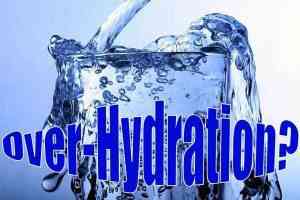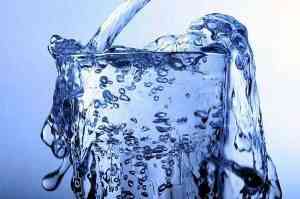OverHydration Is More Common Than You Think
Overhydration occurs when your body takes in too much water. When your body has too much water, it throws the balance off between the water and sodium levels in your blood – a potentially life-threatening condition. Overhydration might not have the reputation that dehydration does, but it is a genuine and serious condition that is detrimental to rider health.
 It IS possible to drink too much water!
It IS possible to drink too much water!
Major Causes of Overhydration
Overhydration occurs in one of two ways: excessive hydration or water retention. Excessive hydration is precisely what it implies; your body has too much water in its system. Water retention occurs when your body is not getting rid of water as it should.
Overhydration through excessive water intake can happen on a conscious and unconscious level. A common cause of conscious excessive water intake would be drinking too much water while riding. An unconscious cause would be increased thirst as a result of taking medication.
Water retention is normally the result of a medical condition. Kidney issues are a major contributor to water retention problems, along with cirrhosis and congestive heart failure.
Related: Keep yourself protected when you crash! Strong shoulder muscles will keep everything in place!
The Effects Of Over-Hydration
The common effects of overhydration are very similar to those associated with dehydration. This makes sense because both are the result of the imbalance of water and sodium levels in the blood.
The common symptoms of being over hydrated include:
- Vomiting and nausea
- Confusion
- Disorientation
- Headaches
- Cramps and spasms
And if left untreated, overhydration can potentially lead to seizures, comas, and even death.
 Any of the symptoms above can have a negative effect on your ability to ride your bike, especially over longer distances. Cramps and spasms can lead to slower reaction times, while vomiting, confusion, and disorientation can cause you to have to stop riding, period.
Any of the symptoms above can have a negative effect on your ability to ride your bike, especially over longer distances. Cramps and spasms can lead to slower reaction times, while vomiting, confusion, and disorientation can cause you to have to stop riding, period.
Treatment
If you’re experiencing the symptoms of overhydration, there are three things you can do to counter its effects:
Take a diuretic. The main function of a diuretic is to help your body get rid of excess water and salt through your urine.
Cut back on your fluid intake. Immediately cease drinking any additional fluids for a while. That means no water, no sports drinks, and especially no caffeinated beverages.
Take medication to prevent other side effects. If you’re suffering from a headache, take an OTC pain pill. If you’re suffering from nausea, take a medication that will help settle your stomach.
Related: Blisters are a part of life when you ride. Here’s how to treat them and even prevent them!
Ways To Prevent Overhydration
Hydration needs vary from person to person. Some people retain more water than others, while some people sweat more than others. Keeping that in mind, here are a few ways to help prevent overhydration.
Calculate your sweat rate. Knowing how much you sweat under certain conditions will tell you how much hydration you need to counteract the amount of water and electrolyte loss. This site will show you how to calculate your sweat rate.
Drink more before the event. Drinking more water and electrolyte drinks before the event will help prevent you from drinking too much after the event. Drinking 16-20 ounces two hours before the event, and another 8-10 ounces 15 minutes prior should do the trick.
Drink sports drinks that have sodium and potassium. Sodium and potassium are known to leave your body through your sweat.
Overhydration is much easier to control than dehydration, but still, keep an eye on your fluid intake!
If you have any questions or anything to add, please leave them in the comments or on our FaceBook page!




